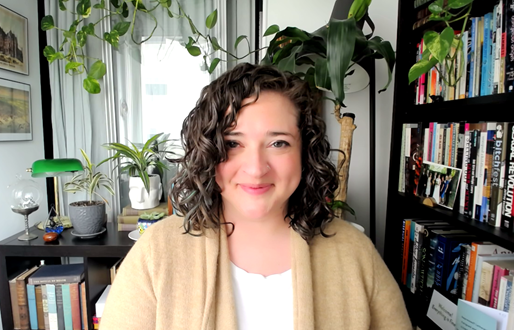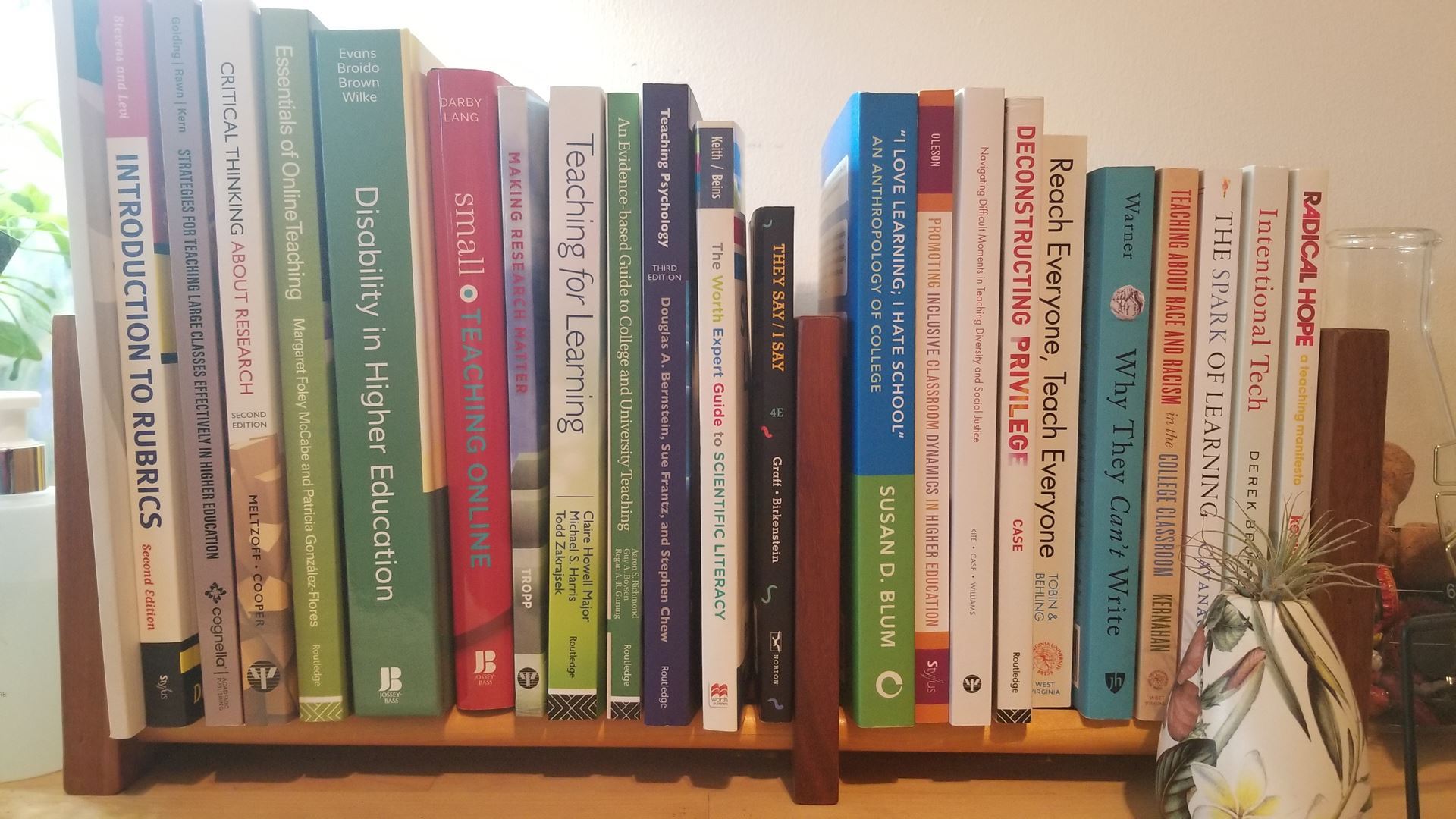 School name: University of Toronto – St. George Campus
School name: University of Toronto – St. George Campus
Type of school: R1 University
School locale (including state and country): Toronto, Ontario, Canada (there are 3 U of T campuses, but I am smack in the middle of downtown Toronto)
How many years have you taught psychology? 10 years as instructor of record, 7 post-PhD
Classes you teach: large enrollment lower-level Statistics 1 and 2 and Intro to Research Methods; smaller upper-level social psych courses like Social Psychology of Emotion and Social Psychology of Close Relationships
Specialization: I am a social psychologist by training, but my position is as an Assistant Professor, Teaching Stream, which means I focus on undergraduate curriculum and teaching in a major research-focused psychology department
Average class size: 200 for Stats, 50 for upper-level social psych courses
What’s the best advice about teaching you’ve ever received? I’m not sure this is the best advice, per se, but perhaps the advice that I consistently carry with me, is that I can’t do everything. There is always more we could do, things we could change, and I struggle with feeling like I’m not succeeding as a teacher because I haven’t implemented some best practice. But, we also need to care for ourselves, and the parts of ourselves that exist outside of work (or, we need to make sure there ARE parts of ourselves that exist outside of work), and being here for my students, imperfect but nourished, is more important than burning myself out while striving for perfection. I’m working on it.
 What book or article has shaped your work as a psychology teacher? This is SERIOUSLY hard to answer, because I am a voracious reader, and have been reading and following psychology and higher education blogs since 2012. I am also an aspirational book buyer – the books (or ebooks) I have on my shelf are my to-do list, a reminder of my values, beautiful office art…what they are not, however, is fully read.
What book or article has shaped your work as a psychology teacher? This is SERIOUSLY hard to answer, because I am a voracious reader, and have been reading and following psychology and higher education blogs since 2012. I am also an aspirational book buyer – the books (or ebooks) I have on my shelf are my to-do list, a reminder of my values, beautiful office art…what they are not, however, is fully read.
As just a couple of examples of things that have spoken to me, though:
- This blog post came across my RSS reader early in grad school, when I was struggling with impostor feelings and feeling like a weirdo for being in a top research program but loving teaching. I was feeling like I wasn’t ‘enough’ somehow, and this post gave me vocabulary to start to explain to myself and others that I wasn’t choosing a ‘lesser’ path.
- This blog post (which is now a full book) was hugely influential in shifting how I think about students who are not like the student I was. I always fancied myself supportive and empathic, but this article really made me think about who my policies were disproportionately harming. It was an important first step down the road of need-supportive teaching, accessibility, equity, and living my values, which I still work on everyday.
Briefly tell us about your favorite lecture topic or course to teach I really love teaching intro stats. I love seeing students go from anxiety and/or disengagement to begrudging appreciation (or even all-out liking).
Briefly describe a favorite assignment or in-class activity. One of my favourite assignments is the blogging assignment I developed for a Close Relationships course and have also used in a Sex & Gender course. It is a semester-long project that helps students think critically about readings, paraphrase technical information, communicate with a non-expert audience, and learn from each other. Also, way more fun to read than research proposals.
Read more about it on the blog itself here and in an STP eBook here!
What teaching and learning techniques work best for you? In stats and methods, I make use of active lecturing techniques, since these classes are 200-400 people. I intersperse periods of lecture with learning check questions, think-pair-share discussions, and activities to practice what we are learning. When I moved to online asynchronous in 2020, I recorded my lectures in small chunks (6-18 min each) and programmed LMS quizzes or discussion boards to mimic the in-class activities I had come to love.
In my upper-level courses, I love taking good time for small group discussion about journal articles multiple times a term. They are in the same small group all semester, so they can get to actually know classmates and not have to do the awkward getting-to-know-you stuff every week, and I provide a discussion guide to keep them on track and make sure they discuss the stuff I want them to talk about. Then, afterward, we take a few minutes as a whole class to highlight key parts of their discussions. It is a great balance of the intimacy of small group work with structure.
 What’s your workspace like? After waiting three years with my itty bitty windowless office, I was finally moved into a bigger, sunlit space… in June of 2020. So I moved all my stuff, but still haven’t really had a chance to nest and make it mine! For now, my workspace is still our tiny home office (with afternoon sunlight and tons of gorgeous plants, courtesy of my green-thumbed spouse) and my Zoom room.
What’s your workspace like? After waiting three years with my itty bitty windowless office, I was finally moved into a bigger, sunlit space… in June of 2020. So I moved all my stuff, but still haven’t really had a chance to nest and make it mine! For now, my workspace is still our tiny home office (with afternoon sunlight and tons of gorgeous plants, courtesy of my green-thumbed spouse) and my Zoom room.
Three words that best describe your teaching style. Conversational, need-supportive, evolving
Tell us about a teaching disaster (or embarrassment) you’ve had and how you dealt with the situation. Scene: Psych 100 TA-led discussion section in my very first quarter of my very first year of graduate school. I am barely older than my students, just 22, and I am trying desperately to be taken seriously. In one session, I am to be introducing students to Alfred Kinsey and the scientific study of sex. One slide has links to different sections of his classic 1948 report, and instead of choosing a topic myself, I want my students to indicate what they most want to learn about. I could say, “tell me what you want to learn about!” but noooooo, instead, I say brightly for all to hear, “okay, who wants anal sex?”
So. That happened. We all laughed and I was slightly less uptight for the rest of the term. No other choice, really!
What is something your students would be surprised to learn about you? Probably something that doesn’t fit the schema of “nerdy professor,” like that I was in a cover band in college, or have been skydiving twice. Those experiences make me sound cooler than I actually am (evidenced by the fact that I used the word ‘cool’).
What are you currently reading for pleasure? Right now I am reading School for Good Mothers by Jessamine Chan. I’m only about 1/3 of the way through and it is hard and sad and haunting and scary, so of course I need to see it through. I have a huge queue of books of all kinds for pleasure (see above re: aspirational book buying) and I do my best to set aside at least a few minutes for reading each day.
What tech tool could you not live without? I don’t know if this counts as a ‘tool’, but I highly value the connection and professional and personal networks that social media supports. Of course there are toxic things in all places inhabited by humans, but overall, my life is better and I am better at my job and a better person because of these virtual social spaces. As many folks know, the STP Facebook group holds a very dear place in my heart (I was mod/admin of the group for 4.5 years) and was especially valuable to me as a grad student/ECP trying to find my way. I also avoided Twitter until June of 2020 when I joined to judge a poster conference, and have since found another amazing community. It connected me with professional spaces I didn’t otherwise have easy access to (e.g., the world of faculty developers) and with voices I didn’t otherwise hear often (e.g., disability scholars and advocates, LGBT scholars and advocates, Black scholars and advocates, Indigenous scholars and advocates), all of which have informed my personal and professional development.
PSYCHSESSIONS: Listen to Molly talk about self-determination theory and other connections between psychology research and her life! "E118: Molly Metz: Multi-Talented, Multiple Interests, Deep Commitment to Teaching, Deep Thinking Overachiever"
